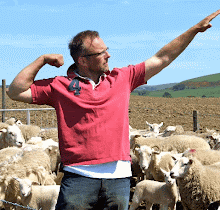There are only two ways to build an agricultural business - 1) production - profit and cash generation and 2) real estate - growing values of property. That’s it, simple as, QED.
This is the constant theme I am finding. Some of you may point out that this theory belongs in the file marked “The Bleedin’ Obvious” right next to the one marked “No poo poo, Sherlock”, but it is really interesting to see these methods employed in an individual’s story and how they inter-relate given different economic conditions.
One of my visits in South Australia was to a man who started out with what would have been barely a five figure sum in pounds sterling and now must have a business worth tens of millions. Through a small family loan, the home farm acting as guarantor and vendor finance (the common practice of the seller of the farm being paid off over a number of years); he managed to purchase his first 900 acres. In the first seven years his business grew 25 times and has continued to expand. He now has over 10,000 acres, most of which is good quality arable ground.
How did he do this? There will be some reasons that would be only obvious if you were there with him along the way - he is obviously an exceptional operator and focused on the essential detail that is crucial to high efficiency. But also what was important was:
- he bought land at, or below, productive value - in the past, as a rule of thumb, this would mean grossing the land’s value in three to five years from production; but this has reduced to an 8- 10% return on capital target. Did some quick figures on this and an acre of land that might support 4 ewes should really be worth £1,000 to £1,800 in the UK (conveniently ignoring SFP and wintering issues)!!!!
- he was bold (procrastination is very dangerous) in his risk taking but crucially managed that risk incredibly well. He transformed alot of land with flood irrigation capability and managed flooding and salination issues through drainage. These works on their own increased the value of the land considerably but also ensured production and hence cash generation. He questioned the theory that you can’t manage the weather - he has by ensuring a minimum of 60% of potential production when there would have been nothing following extreme weather events.
- the two biggest effects on his business, cost him nothing except courage. He implemented a totally different way of managing his staff that ensured they had status, satisfaction and security. The responsibility to achieve tasks was all theirs and also judged by their peers. He plotted a graph of his net worth and at the point he implemented this, the line increased sharply. Later he set up a board to run his business, all decisions were made by the board that didn’t include him or his sons! The board was made up of trusted people and the family could make a case for an action but it had to be researched to death and very persuasive - again at the point this was implemented the line of Net Worth increased.
From being a bit over-obsessed with “heart” as an essential to first generation farming, this visit really emphasised to me the need for “head” usage in decision making. Maybe the heart could be the engine but the head the steering wheel, accelerator and even handbrake .... mmm - need to work on my analogies.









No comments:
Post a Comment